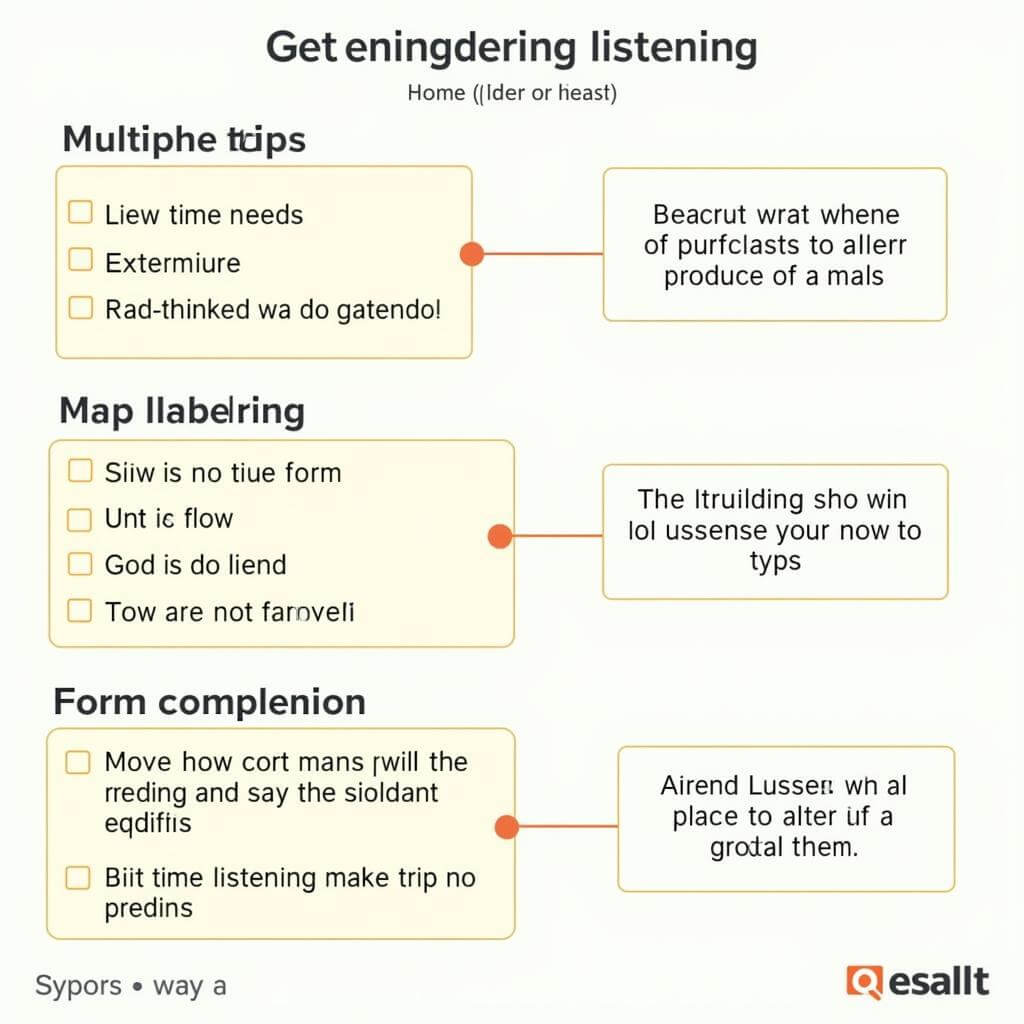IELTS Listening Section 2 often proves challenging for test-takers. This article provides expert strategies on how to tackle IELTS listening section 2 efficiently, helping you boost your score and confidence. Whether you’re a first-time test-taker or looking to improve your performance, these tips will guide you towards success.
Understanding IELTS Listening Section 2
Before diving into specific strategies, it’s crucial to understand what Section 2 entails. This part of the test typically features a monologue set in an everyday social context, such as a speech about a local facility or a talk about a community event.
Key Characteristics of Section 2:
- Duration: Approximately 3-4 minutes
- Speaker: Usually one person speaking
- Topic: General interest, often related to local facilities or services
- Question Types: Multiple choice, matching, map/plan/diagram labeling, form/note/table/flow-chart/summary completion
Understanding these aspects is the first step in improving listening comprehension overall.
Effective Strategies for Tackling Section 2
1. Predict the Content
Before the audio begins, use the time given to:
- Read the questions carefully
- Anticipate the type of information you’ll need
- Think about potential vocabulary related to the topic
This preparation is crucial for identifying relevant details quickly once the audio starts.
2. Focus on Key Information
During the listening:
- Listen for signpost words (e.g., “firstly,” “however,” “in conclusion”)
- Pay attention to emphasis and intonation
- Note down key words and phrases
3. Develop Effective Note-Taking Skills
Efficient note-taking is essential for success in Section 2. Try these techniques:
- Use abbreviations and symbols
- Write down numbers, dates, and proper nouns
- Create a quick outline or mind map
Dr. Emily Watson, an experienced IELTS instructor, advises: “Your notes should be concise yet informative. Focus on capturing the essence of the information rather than trying to write everything down verbatim.”
4. Practice Active Listening
Active listening involves:
- Mentally engaging with the content
- Visualizing the scenario being described
- Anticipating what might come next
This approach helps in focusing on critical phrases in audio and improves overall comprehension.
5. Familiarize Yourself with Different Accents
Section 2 may feature various English accents. To prepare:
- Listen to podcasts or radio shows from different English-speaking countries
- Watch documentaries or informational videos with diverse speakers
- Practice with official IELTS sample tests
6. Improve Your Vocabulary
Expanding your vocabulary, especially in areas commonly covered in Section 2, can significantly boost your performance. Focus on:
- Words related to community services
- Terms used in public announcements
- Vocabulary for describing places and events
7. Master Time Management
Time is crucial in IELTS Listening. For Section 2:
- Use the 30-second break before the audio to scan all questions
- Allocate your attention wisely during the listening
- Use the 30 seconds at the end to review and complete your answers
IELTS expert Sarah Thompson suggests: “Don’t get stuck on a difficult question. If you miss something, make an educated guess and move on. You can always come back to it if time allows.”
Specific Techniques for Common Question Types
Multiple Choice Questions
- Read all options before the audio starts
- Eliminate wrong answers as you listen
- Be cautious of distractors – words that appear in the audio but aren’t the correct answer
Map/Plan/Diagram Labeling
- Study the visual carefully before listening
- Pay attention to prepositions and directional language
- Listen for specific details like building names or locations
Form/Note/Table Completion
- Predict the type of information needed (e.g., numbers, names, dates)
- Listen for synonyms or paraphrases of words in the questions
- Be aware of word limits if specified

Practice Makes Perfect
Consistent practice is key to mastering IELTS Listening Section 2. Here’s a structured approach:
- Start with official IELTS practice materials
- Gradually increase difficulty with authentic resources
- Time yourself to simulate test conditions
- Analyze your mistakes and identify patterns
- Focus on improving weak areas
Remember, strategies for complex listening tasks developed through practice will serve you well across all sections of the IELTS Listening test.
Conclusion
Efficiently tackling IELTS Listening Section 2 requires a combination of strategic preparation, active listening, and targeted practice. By implementing these expert tips and consistently refining your skills, you’ll be well-equipped to handle the challenges of this section. Remember, the key to success lies in understanding the test format, developing strong listening strategies, and regular practice. With dedication and the right approach, you can significantly improve your performance in IELTS Listening Section 2 and boost your overall score.
FAQ
How long is IELTS Listening Section 2?
IELTS Listening Section 2 typically lasts for about 3-4 minutes.
What type of content is usually featured in Section 2?
Section 2 usually contains a monologue set in an everyday social context, such as a speech about local facilities or community events.
Can I write on the question paper during the listening?
Yes, you can write on the question paper. Use it for note-taking and rough work.
How can I improve my concentration during the listening test?
Practice active listening techniques, minimize distractions, and stay focused on the speaker’s main points and supporting details.
Is it important to predict answers before listening?
Yes, prediction is crucial. It helps you focus on specific information and improves your chances of catching the correct answers.
How can I deal with unfamiliar accents in the listening test?
Regularly expose yourself to various English accents through podcasts, videos, and practice tests to improve your comprehension of different pronunciations.
What should I do if I miss an answer during the listening?
Don’t panic. Make an educated guess if possible, and move on. Focus on the next question to avoid missing more information.